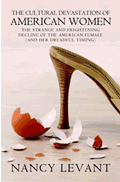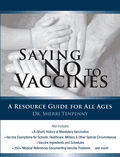EIGHTEEN DEATHS LINKED TO GARDASIL VACCINE REPORT CLAIMS
By
NWV Staff Writer, Sarah Foster
Posted 1:00 AM Eastern
July 17, 2008
© NewsWithViews.com
A recent publication by a conservative watchdog group has rekindled media interest in a controversial anti-virus vaccine and sent Big Pharma and federal health agency officials into damage control mode.
In a 25-page special report released June 30, Judicial Watch -- a Washington DC-based nonprofit organization that promotes “transparency and accountability in government” – presents evidence based on government documents that in the two years since being licensed by the Food and Drug Administration, Merck & Co’s Gardasil, heavily promoted as a safe and effective vaccine against cervical cancer, has been connected with nearly 9,000 “adverse events,” including the deaths of 18 – perhaps 20 – girls and young women.
In addition, there were 140 “serious” events reported (27 categorized as “life-threatening”), with 10 spontaneous abortions and six cases of Guillain-Barre Syndrome – all since January 2008.
Guillain-Barre Syndrome (GBS) is a rare, potentially devastating autoimmune disorder that attacks the peripheral nervous system and can lead to paralysis and, occasionally, death. There is no known cure or cause, but a fact sheet from the National Institute of Health says it’s sometimes triggered by surgery or vaccinations. Judicial Watch uncovered a total of 38 cases of GBS have been filed with the FDA since June 2006 (six since January) among girls who had received at least one dose of the three-dose vaccine.
The records indicate 10 deaths since last September, bringing the total number of Gardasil-connected death reports in the United States to at least 18 – four of these were from blood clots, nine from unknown or unidentifiable causes.
The fatalities include:
-
A 20-year-old woman with no medical history reported, who was vaccinated April 1, 2008, with Gardasil and died four days later, seeking medical attention. An autopsy was performed which ruled out suicide or anything suspicious. The cause of death is currently unknown. [VAERS ID 310262-1 (D)]
-
A 12-year-old girl with no reported medical problems, who died in her sleep of known causes on Oct. 6, 2007, three weeks after receiving a Gardasil shot. [VAERS ID: 297528-1 (D)]
-
An 11-year-old girl, vaccinated in May 2007 with a first dose of Gardasil, who died three days later after going to an emergency room. A physician at the hospital said “death was due to an anaphylactic [severe allergic] reaction to Gardasil.”[VAERS ID 280163-1 (D)]
Because adverse reactions to medication tend to be underreported, Judicial Watch believes the actual number is likely to be higher.
“I think we’ve uncovered a lot of disturbing things about Gardasil,” said Judicial Watch president Tom Fitton. “All we’re asking for is further investigation of its safety. We’re not convinced they’re taking these reports seriously.”
Gardasil is the first vaccine on the market that targets the four strains of sexually transmitted human papillomavirus (HPV) believed to account for most cases of cervical cancer and genital warts infections.
HPV is not contagious in the way tuberculosis or measles or the common cold is. You don’t become HPV-infected by being in a crowd or sitting near someone, but through skin-to-skin contact. There are over 100 strains of HPV, 30 of which are sexually transmitted – and of these 30, 15 can cause cervical lesions and other abnormalities that may develop into cervical cancer, while about 12 can cause genital warts. Two of the strains targeted by Gardasil (HPV 16 and 18) are believed responsible for 70 percent of the cancer cases, the other two (HPV 6 and 11) cause 90 percent of the genital warts infections.
The FDA approved Gardasil on June 8, 2006, for girls and women ages nine to 26. Less than a month later the Centers for Disease Control and Prevention’s Advisory Committee on Immunization Practices (ACIP) recommended vaccination for all girls, ages 11 to 12. The committee’s first report on Gardasil was published the following March.
Gardasil was fast-tracked and received FDA approval before testing was complete and its final safety evaluation trials won’t be concluded until Sept. 2009. Despite this, the drug is being aggressively mass-marketed on TV and at the movies in ads pitched to young girls, including preteens, and state legislators were heavily lobbied to make the drug mandatory for school girls ages 11 up. Sold worldwide, Merck reports over 16 million doses of the vaccine have been distributed in the U.S. , and eight million women and girls have received at least one shot of the three-dose regimen.
The special report – its complete title is Examining the FDA’s HPV Vaccine Records: Detailing the Approval Process, Side-Effects, Safety Concerns and Marketing Practices of a Large-Scale Public Health Experiment -- continues work Judicial Watch began in 2007 when it published two analyses (the first in May of that year, the second in Oct.) of Gardasil-related documents it had received in sets from the FDA, after making requests through the Freedom of Information Act.
As in its earlier reports, the group raises serious questions about the vaccine’s effectiveness, safety, long-range effects and overall costs -- which are astronomical. At $120 a shot ($360 for the requisite three-doses), Gardasil is the most expensive vaccine on the market.
The VAERS Reports
Using FOIA, Judicial Watch obtained thousands of pages from the FDA, including 8,864 reports filed by doctors, nurses, parents and others with the Vaccine Adverse Events Reporting System [VAERS] – a database shared by the CDC and FDA -- detailing reactions experienced by girls and women after receiving at least one shot of the vaccine.
Besides the deaths, the VAERS reports reveal a gamut of reactions – from trivial to terrifying -- including vomiting, dizziness, seizures, paralysis and Guillain-Barre Syndrome, swelling at the injection site and in lymph nodes in the neck and groin, fevers, hives, shortness of breath, nausea and flu-like symptoms.
There were reports of a sudden appearance of blisters on a 20-year-old's upper arms and back and ano-genital warts on a 12-year-old. A 15-year-old reported blisters that appeared in her vaginal area within two days of receiving the vaccine and spread to her upper body and behind her ears and knees. These lasted five to seven days, then developed scabs.
Judicial Watch’s use and dissemination of VAERS reports have drawn criticism from the FDA, the CDC, Merck and other advocates of the vaccine, in part because anyone can file a VAERS report -- physicians, nurses, family members and patients -- so the accounts tend to be dismissed as “anecdotal” and lacking-in-evidence. More important, they don’t prove the vaccine caused the event.
In the wake of the Judicial Watch report, Merck issued a press statement downplaying the findings.
The mega-drug company claimed to have “analyzed the adverse events reported for Gardasil … and based on the data available to Merck, believes that no safety issue related to the vaccine has been identified. … An adverse experience report describes an event that occurred after vaccination and does not necessarily mean that the vaccine caused or contributed to the event. The vast majority of adverse events that have been reported to Merck are non-serious and the most common include dizziness and syncope (fainting).”
In a similar vein, FDA spokeswoman Kelly Riley told the Sydney Morning Herald, an Australian newspaper, that there was nothing in the VAERS reports to cause a review of the usefulness of the vaccine. “These adverse reaction reports have not been analyzed. If there’s a death after someone received a vaccine, and long after they had a car crash, a bee sting … these would be filled out. It does not mean Gardasil caused it.”
The FDA and CDC said that safety data reviewed in approving Gardasil showed only mild side effects, like pain at the injection site or fainting.
But Tegan Millspaw, the report’s lead researcher and principal author, says these critics are missing the point.
“Judicial Watch was not and is not interested in proving causality,” she writes. ”Only science can do that. And that is why we asked for more investigation of the VAERS reports to ensure there was no causality between Gardasil and the serious reported adverse reactions”
There were 18 deaths, she points out – and of those, 11 occurred less than a week after the girl had received the vaccine, seven in less than two days.
“Perhaps all these deaths are simply coincidence, but given the unknowns about Gardasil and its overall safety, it is far too important an issue to simply ignore,” Millspaw states.
Making Bad Symptoms Worse
Attracting less attention from the media are the cases of groin and genital warts – 78 VAERS-reported cases -- which weren’t supposed to happen considering that Gardasil is a vaccine against the two strains of HPV that cause 90 percent of such outbreaks. But Gardasil is not a cure, it is a preventative medication – and in some instances it seems to have triggered outbreaks or made existing conditions worse, for there are reports of warts suddenly appearing after vaccination on the face, hands, feet and chest.
“Not only will Gardasil not cure pre-existing HPV, it can also make symptoms worse,” warns Millspaw in the report. “Women who already have the virus without knowing it could suffer massive outbreaks of genital warts or abnormal precancerous lesions, both of which require extensive treatment.”
“The outcomes that can result from pre-exposure are disconcerting and deserve far more attention.”
Contacted by telephone, Millspaw told NewsWithViews of her concern that Merck did not screen women prior to vaccination for possible HPV exposure or infection.
“The reason they target very young girls is it’s easier to assume they don’t have the viruses – but the women are not screened to see if they’ve been exposed. The FDA allows that, which I find very disturbing.”
Asked whether the drug could cause sterility, Millspaw told NewsWithViews there’s “no indication” of this – “but they’re now vaccinating very young girls, so it will be years before long-term effects are known. They haven’t done enough tests to know at this point.”
Millspaw brought up another long-range possibility. “A lot of scientists are worried that preventing these four strains may just cause other HPV viruses to take their place,” she said. “That could be serious, particularly because while the vaccine protects against two main forms of cervical cancer the other [13] strains are usually more severe.”
“Given all the questions about Gardasil, the best public health policy would be to re-evaluate its safety and to prohibit its distribution to minors,” said Tom Fitton in a press release. “In the least, governments should rethink any efforts to mandate or promote this vaccine for children.”
Backlash
Fitton was referring particularly to the action that sparked the most controversy about the vaccine and unleashed a furious backlash against it: Merck’s aggressive lobbying aimed at state legislatures.
The company began marketing the drug even before the FDA gave the green light. Not by name – that would be illegal -- but through a sophisticated, high-pressure public relations campaign using TV and Internet ads designed to frighten young girls about cervical cancer and HPV, so that they would accept – and demand – the drug once it became available.
But Merck was not content merely to advertise the vaccine and make it accessible to those who wanted it; as soon as it got the high-sign from the FDA it funded a huge lobbying effort to persuade state lawmakers to mandate Gardasil vaccination of young girls, including preteens, as a condition for attending public or private school.
The campaign has been fairly successful. To date: 41 states have introduced legislation to require, fund or educate the public about the HPV vaccine and 17 enacted legislation. Three considered making vaccination mandatory.
It was too much. Parents and consumer advocates from all points across the political spectrum were outraged, and in Feb. 2007 Merck announced it was dropping its lobbying campaign – though its TV advertising continues. But the lobbying was so intense, many former supporters were inspired to take a closer look at Merck and to question its motives for mass-marketing a drug before it’s been fully tested and evaluated for safety and efficacy.
A ‘Wonder Drug’ for Merck?
For instance, last July Judith Siers-Poisson, editor of PR Watch, authored a devastating four-part series for CounterPunch, a leftist biweekly newsletter, titled “The Politics and PR of Cervical Cancer,” in which she took a hard look at HPV and Gardasil – “the facts, the hype, and what Merck stands to gain, the marketing campaigns … and the media’s lack of attention to concerns about the rush to mandate vaccination…”
“Guardasil is being touted as a “wonder drug” for women. Might it also be a wonder drug for Merck?” Siers-Poisson asked then answered:
“In the world of drugs, vaccines for use by the whole population are close to corporate nirvana since they ensure a mass market for prevention instead of having to wait to identify the smaller number of people who actually develop a particular disease. In addition, mandating vaccination helps ensure a mass market and gets the government involved in what would otherwise be left to market forces.”
The drug could likely go far in replenishing the pockets of the firm as it recovers from the Vioxx recall, in which Merck’s pain medication was held to be responsible for 27,000 heart attacks and sudden cardiac deaths. Analysts estimate that the Vioxx recall decreased Merck’s stock value, and could cost Merck up to $20 billion in legal settlements.
At $360 for the three-shot regimen, Gardasil is the most expensive vaccine the FDA has ever approved. A measles-mumps-rubella combo costs $42.85. The New York Times estimates that making the vaccine mandatory would double the cost of existing vaccine programs. And John Schiller, a senior investigator for the National Institute, told the Times “This vaccine will be more expensive than all childhood vaccines put together.”
But whether paid for by insurance, tax dollars, or individual parents – at $360 a patient Merck is guaranteed billions of dollars.
It’s already paying off. Even without Gardasil being mandated, the incessant campaign has persuaded millions of young women to be vaccinated – and netted Merck $1.5 billion in sales revenue in 2007, according to the Securities and Exchange Commission.
How Serious a Threat?
But how serious a threat is the disease which is already costing millions of dollars to vaccinate against?
Cervical cancer is a major killer of women in non-industrial nations – as it once was in this country. Worldwide it affects 470,000 women and kills 233,000 each year. This is not the case in the United States thanks to widespread Pap screening. This is a medical screening test involving the examination of cells taken from the cervix to detect pre-malignant and malignant cervical cancer cells. It is named after its inventor, Dr. George Papanicolaou, who developed it over 60 years ago.
As a result of routine Pap tests and early, follow-up treatment when necessary, the deaths from cervical cancer plummeted 74 percent between 1955 and 1992, according to the American Cancer Society, and that rate continues downward by about four percent a year.
Today in the United States cervical cancer is so rare that it is not on the National Cancer Institute’s list of 13 most common cancers. To qualify as a common cancer, the estimated annual incidence for 2008 had to be 35,000 cases or more.
Nor is it among the top 10 deadliest diseases for women, which are heart disease and stroke, followed by lung cancer (third place, with 71,030 deaths), breast cancer (6th, with 40,480 deaths) and colon cancer (10th with 25,700 deaths), according to the American Cancer Society.
The American Cancer Society estimates that in 2008, about 11,070 women in the United States will be diagnosed with invasive cervical cancer in the United States and 3,870 women will die from it. The tragedy behind those deaths is that they could likely have been prevented had the women received regular Pap tests and treatment.
Millspaw concludes: “With these statistics in mind, one must ask whether Gardasil vaccination is absolutely necessary, especially for children. At this point in time, we do not know if it will prevent cancer, or whether it will have unforeseen consequences. The American public must ask themselves if Gardasil is really worth the risk. Fast-tracking drugs and vaccines before their safety has been fully evaluated is unethical and dangerous, and until more tests have been completed on Gardasil no vaccination mandates should be established.”
|
Subscribe to the NewsWithViews Daily News Alerts! |
Below is a list from the special report summarizing objections to the vaccine
-
Gardasil has not been tested thoroughly enough to know whether it will be safe or effective in the long term.
-
Even if it is shown that the Gardasil vaccine is effective, it is still unknown how long the vaccine lasts or if there will be a need for booster shots.
-
Regardless of its potential to help prevent HPV and cancer, Gardasil should never be administered without a prescreening for HPV since it has the potential to make existing cases worsen.
-
It is important that people remember that this vaccine will not eliminate the need for regular PAP screening. No vaccine is 100 percent effective, and Gardasil is designed to protect against only four strains of HPV.
-
While Gardasil may be an important medical advance, it is unwise to compromise the health and safety of the American public, especially children, by mandating or marketing it before sufficient tests are concluded.
Links for Further Reading
1. Judicial Watch has posted its earlier publications, VAERS reports and other documents on its website: http://www.judicialwatch.org/gardasil
2. George F. Sawaya, M.D., and Karen Smith-McCune, M.D., Ph.D: “HPV Vaccination: More Answers, More Questions,” New England Journal of Medicine, May 10, 2007
3. Judith Siers-Poisson: “The Politics and PR of Cervical Cancer”four parts), posted at PR Watch.
4. Cindy Bevington: “Researcher blasts HPV Marketing.” An interview with Diane Harper, Fort Wayne Daily News.
Selected Earlier Stories
1. Devvy Kidd: How Many More Will Die Before FDA Ghouls Are Held Accountable?, July 14, 2007
2. Sherri Tenpenny, M.D.: Reasons to Just Say No to Vaccines, July 9, 2008
3. Devvy Kidd: Treachery and Tragedy, Oct. 8, 2007
4. Sherri Tenpenny, M.D.: Gardasil Dangers Starting to Emerge, May 10, 2007
5. Devvy Kidd: Confirmed: Your Daughter is Merck’s Guinea Pig, March 16, 2007
6. Devvy Kidd: Texas HPV Vaccination: Parents Can Opt Out, Feb. 8, 2007
7. Mary Starrett: Cancer Vaccine for Sexually Active Pre-teens?, July 26, 2006
© 2008 NWV - All Rights Reserved












